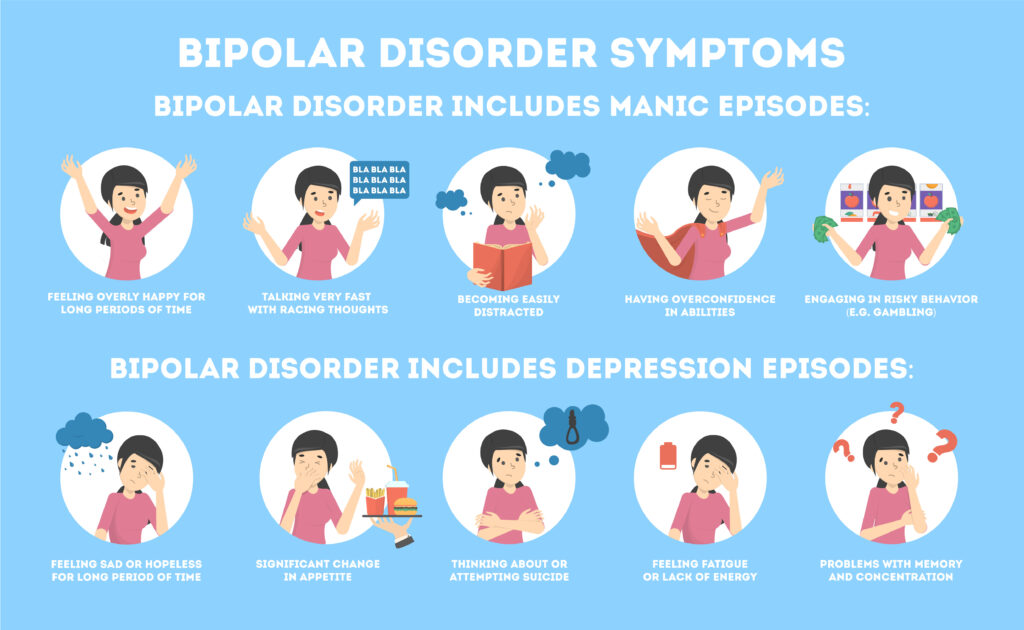Living with bipolar disorder can be a challenging journey. It’s a mental health condition that is characterized by extreme mood swings, including emotional highs (mania or hypomania) and lows (depression). It affects millions of people worldwide and can significantly impact their daily lives, relationships, and overall well-being. Unfortunately, bipolar disorder is also often misunderstood, leading to misconceptions and delayed treatment. Those who suffer from bipolar disorder should know that they are not alone and that there is help available. In this blog post, we will discuss what bipolar disorder is, its symptoms, and when to seek help.
What is Bipolar Disorder?
Bipolar disorder, formerly known as manic depression, is a chronic mental health condition that affects the brain’s ability to regulate mood. It is marked by periods of intense emotional highs, known as manic or hypomanic episodes, and lows, known as depressive episodes. These mood shifts can range from mild to severe and can occur rarely or multiple times a year.
Types of Bipolar Disorder:
- Bipolar I Disorder: Characterized by manic episodes that last at least seven days or by manic symptoms that are so severe that immediate medical care is needed. Depressive episodes typically occur as well, lasting at least two weeks.
- Bipolar II Disorder: Defined by a pattern of depressive episodes and hypomanic episodes, but not the full-blown manic episodes experienced in Bipolar I Disorder.
- Cyclothymic Disorder (Cyclothymia): A milder form of bipolar disorder characterized by numerous periods of hypomanic symptoms as well as numerous periods of depressive symptoms lasting for at least two years (one year in children and adolescents).
Recognizing Symptoms

Manic Episode Symptoms:
- Feeling overly elated or happy
- Increased energy, activity, or agitation
- Racing thoughts and rapid speech
- Decreased need for sleep
- Impulsive behavior
- Poor decision-making
- Unrealistic belief in one’s abilities
Depressive Episode Symptoms:
- Persistent sadness or emptiness
- Loss of interest in activities once enjoyed
- Significant changes in appetite or weight
- Difficulty sleeping or oversleeping
- Fatigue or loss of energy
- Feelings of worthlessness or excessive guilt
- Difficulty concentrating or making decisions
- Thoughts of death or suicide
When to Seek Help:
Recognizing the signs of bipolar disorder is crucial for timely intervention and effective management. If you or someone you know experiences symptoms of bipolar disorder, it’s essential to seek professional help. Here are some indicators that it’s time to reach out to a healthcare provider:
- Noticeable Changes in Mood: If you or a loved one experiences extreme mood swings that interfere with daily functioning, relationships, or work responsibilities, it’s important to seek evaluation from a mental health professional.
- Disrupted Sleep Patterns: Significant changes in sleep patterns, such as insomnia or sleeping excessively, can be indicative of a mood disorder like bipolar disorder.
- Impulsive or Risky Behavior: Engaging in reckless behaviors, such as excessive spending, substance abuse, or risky sexual encounters, during manic episodes can signal the presence of bipolar disorder.
- Thoughts of Self-Harm or Suicide: If you or someone you know expresses thoughts of self-harm or suicide, it’s crucial to seek immediate help from a mental health professional or emergency services.
- Impact on Daily Life: When mood swings significantly impact daily life, including relationships, work, or school, seeking help is imperative for proper diagnosis and management.
Encountering the challenges of bipolar disorder can be demanding, but it is crucial to recognize that effective treatment is available. Understanding the symptoms and knowing when to seek help makes it possible to receive timely support and access appropriate treatment options. If you or someone you know exhibits signs of bipolar disorder, reach out to a healthcare provider or mental health professional, such as Comprehensive Healthcare, for a thorough evaluation and support. If you or someone you know is having a crisis, don’t hesitate to call the crisis line (988) for immediate assistance. With proper treatment and support, individuals with bipolar disorder can lead fulfilling and productive lives.



